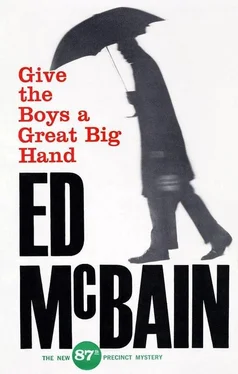But Cronin had a few other things to worry about. By his own admission, he and Martha Livingston had lit a few sticks before hopping into bed together and Section 2010 of the Penal Law quite bluntly stated: “Perpetration of an act of intercourse with a female not one’s wife who is under the influence of narcotics is punishable by an indeterminate sentence of one day to life or a maximum of twenty years.”
When the gun charge was added to this, and the running of an illegal crap game considered, even if one wished to forget the simple charge of simple adultery — a misdemeanor punishable by imprisonment in a penitentiary or county jail for not more than six months, or by a fine of not more than $250, or by both — even if one wished to forget this minor infraction, Leonard Cronin was going to be a busier little man than he had ever been.
As for Martha Livingston, she’d have been better off exploring Africa. Even allowing for her own conviction that all men stank, she had certainly chosen a prize this time. The narcotics, whomever they belonged to, had been found in her pad. The lady who’d fallen in love at first sight was going to have a hell of a tough row to hoe.
But whatever else lay ahead for the hapless lovers, homicide and butchery would not be included in the charges against them. A check with the clothing store Leonard Cronin named proved that he had indeed purchased his funeral outfit on Thursday. A further check of his rooming-house closet showed that he owned no other black garments. And neither did Mrs. Livingston.
There must be a God, after all.
On Sunday morning, Cotton Hawes went to church in the rain before reporting to work.
When he came out, it was still raining and he felt much the same as he’d felt before the services. He didn’t know why he expected to feel any different; he’d certainly never been washed by any of the great religious fervor that had possessed his minister father. But every Sunday, rain or shine, Cotton Hawes went to church. And every Sunday he sat and listened to the sermon, and he recited the psalms, and he waited. He didn’t know exactly what he was waiting for. He suspected he was waiting for a bolt of lightning and an earsplitting crash of thunder that would suddenly reveal the face of God. He supposed that all he really wanted to see was a glimpse of something that was not quite so real as the things that surrounded him every day of the week.
For whatever else could be said about police work — and there were countless things to be said, and countless things being said — no one could deny that it presented its practitioners with a view of life that was as real as bread crumbs. Police work dealt with essentials, raw instincts and basic motives, stripped of all the hoop-dee-dah of the sterilized, compressed-in-a-vacuum civilization of the twentieth century. As he walked through the rain, Hawes thought it odd that most of the time consumed by people was spent in sharing the fantasies of another. A thousand escape hatches from reality were available to every man jack in the world — books, the motion pictures, television, magazines, plays, concerts, ballets, anything or everything designed to substitute a pretense of reality, a semblance of real life, a fantasy world for a flesh-and-blood one.
Now perhaps it was wrong for a cop to be thinking this way, Hawes realized, because a cop was one of the fantasy figures in one of the world’s escapes: the mystery novel. The trouble was, he thought, that only the fantasy cop was the hero while the real cop was just a person. It seemed somehow stupid to him that the most honored people in the world were those who presented the fantasies, the actors, the directors, the writers, all the various performers whose sole reason for being was to entertain. It was as if a very small portion of the world was actually alive, and these people were alive only in so far as they performed in created fantasies. The rest of the people were observing; the rest of the people were spectators. It would not have been half so sad if these people were viewing the spectacle of real life. Instead, they were observing only a representation of life, so that they became twice-removed from life itself.
Even conversation seemed to concern itself primarily with the fantasy world, and not the real. Did you see Jack Paar last night? Have you read Doctor Zhivago? Wasn’t Dragnet exciting? Did you see the review of Sweet Bird of Youth? Talk, talk, talk, but all of the talk had as its nucleus the world of make-believe. And now the television programs had carried this a step further. More and more channels were featuring people who simply talked about things, so that even the burden of talking about the make-believe world had been removed from the observer’s shoulders — there were now other people who would talk it over for him. Life became thrice-removed.
And in the midst of this thrice-removed existence, there was reality, and reality for a cop was a hand severed at the wrist.
Now what the hell would they do with that hand on Naked City?
He didn’t know. He only knew that every Sunday he went to church and looked for something.
On this Sunday, he came out feeling the same as when he’d gone in, and he walked along the shining wet sidewalk bordering the park, heading for the station house. The green globes had been turned on in defense against the rain, the numerals “87” glowing feebly against the slanting gray. He looked up at the dripping stone façade, climbed the low flat steps, and entered the muster room. Dave Murchison was sitting behind the desk, reading a movie magazine. The cover showed a picture of Debbie Reynolds, and the headline asked the provocative question What Will Debbie Do Now?
He followed the pointing arrow of the DETECTIVE DIVISION sign, climbed the metal steps to the second story, and walked down the long, dim corridor. He shoved through the gate in the slatted railing, tossed his hat at the rack in the corner, and went to his desk. The squadroom was oddly silent. He felt almost as if he were in church again. Frankie Hernandez, a Puerto Rican cop who’d been born and raised in the precinct neighborhood, looked up and said, “Hi, Cotton.”
“Hello, Frankie,” he said. “Steve come in yet?”
“He called in about ten minutes ago,” Hernandez answered. “Said to tell you he was going straight to the docks to talk to the captain of the Farren.”
“Okay,” Hawes said. “Anything else?”
“Got a report from Grossman on the meat cleaver.”
“What mea — oh yeah, yeah, the Androvich woman.” He paused. “Any luck?”
“Negative. Not a thing on it but yesterday’s roast.”
“Where is everybody, anyway?” Hawes asked. “It’s so quiet around here.”
“There was a burglary last night, grocery store on Culver. Andy and Meyer are out on it. The loot called in to say he’d be late. Wife’s got a fever, and he’s waiting for the doctor.”
“Isn’t Kling supposed to be in today?”
Hernandez shook his head. “Swapped with Carella.”
“Who’s catching, anyway?” Hawes said. “You got a copy of the duty sheet around?”
“I’m catching,” Hernandez said.
“Boy, it sure is quiet around here,” Hawes said. “Is Miscolo around? I’d like some tea.”
“He was here a little while ago. I think he went down to talk to the Captain.”
“Days like this... ,” Hawes started, and then let the sentence trail. After a while, he said, “Frankie, you ever get the feeling that life just isn’t real?”
Perhaps he’d asked the wrong person. Life, to Frankie Hernandez, was very real indeed. Hernandez, you see, had taken upon himself the almost impossible task of proving to the world at large that Puerto Ricans could be the good guys in life’s little drama. He did not know who’d been handling his people’s press relations before he happened upon the scene, but he did know that someone was handling it all wrong. He had never had the urge to mug anyone, or knife anyone, or even to have a single puff of a marijuana cigarette. He had grown up in the territory of the 87th Precinct, in one of the worst slums in the world, and he had never so much as stolen a postage stamp, or even a sidelong glance at the whores who paraded La Vía de Putas. He was a devout Catholic whose father worked hard for a living, and whose mother was concerned solely with the proper upbringing of the four children she had brought into the world. When Hernandez decided to become a cop, his mother and father approved heartily. He became a rookie when he was twenty-two years old, after having served a four-year hitch in the Marines and distinguishing himself in combat during the hell that was Iwo Jima. In his father’s candy store, a picture of Frankie Hernandez in full battle dress was pasted to the mirror behind the counter, alongside the Coca-Cola sign. Frankie’s father never failed to tell any stranger in the store that the picture was of his son Frankie who was now “a detective in the city’s police.”
Читать дальше





![Ричард Деминг - Whistle Past the Graveyard [= Give the Girl a Gun]](/books/412176/richard-deming-whistle-past-the-graveyard-give-t-thumb.webp)






